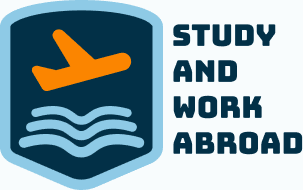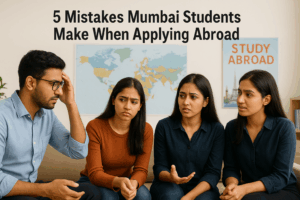Call Us:+91-9920234749, +91-9833420909 info@studyandworkabroad.in
Student Visa Process Explained: From Application to Arrival
It can be hard to get a student visa, but if you know what to do at each step, the process will go much more smoothly. Here is a complete guide to getting a student visa, from choosing the right type of visa to getting ready for your arrival.
Introduction to Visa Types
The type of student visa you need depends on the country, the length of your studies, and the level of your studies:
- The F-1 visa is for students who want to go to an approved institution in the United States, like a college or language lab. There are times when you can work part-time while having an F-1 visa.
- With an M-1 visa, you can study in the United States in a trade or non-academic program.
- Tier 4 Student Visa is for international students who want to go to college in the U.K.
- Students from outside of Australia need to have a Subclass 500 visa to study full-time and work in Australia.
- To study in Canada, New Zealand and Germany, you need to have a student visa.
Learn about the specifics of each type of visa for the country where you want to study through the informative articles by Study And Work Abroad. Each type has different rules about what you can do, how to apply, and how much work you can do.
Document Checklist for Student Visa
For a visa application to be accepted, documented proof of your eligibility is needed. Make sure you have all the document proof you need on hand to speed up the process:
- Passport: Check that it’s still valid for at least six months after your study period is over.
- Acceptance Letter: An official letter from your college saying that you have been accepted or admitted to the University.
- Financial Evidence: Documents like bank statements, education loan letter, sponsorship affidavits or letters of support can show that you can pay for tuition, living costs, and travel.
- Academic Records: Academic Transcripts, awards, and test scores (like GMAT or GRE) if needed.
- Passport Photos: Following the foreign country’s guidelines for digital photographs is important.
- Visa Form: Fill out all of the sections correctly and honestly.
- English Proficiency: Proof that you meet the language standards of the college and the visa rules (like IELTS, TOEFL)
- Health Insurance: Some countries require proof that you have health insurance that covers you while you’re there.
Depending on which country you want to go, you may need other things, like a Criminal Background Check (PCC), medicals and letters of recommendation.
How to Prepare for and Succeed in Your Student Visa Interview
Interviews for visas can be scary, but you have a better chance of passing if you’re ready:
- Prepare well: Prepare your answers to some of the most common questions such as what you want to study, how much money you have, and why you picked this college and what are your future plans.
- Be honest and sure of yourself: Visa officers want to hear honest and confident answers, so be open about your goals and skills.
- Show that you have ties to your country: Many countries want to know that you plan to return home when you finish studies. Focus on connections, like family, job opportunities, or property, to show what you want.
- Prepare documents ahead of time: Bring your acceptance letter, proof of funds, and any other needed papers that are well-organized so that you can quickly present them if asked.
Common Pitfalls While Applying for Student Visa
There are many details to the student visa process, and if you make a mistake, it could delay or even reject your application:
- Double-check each area of the application to ensure it’s correct. If information is omitted, it could slow down the process or even cause a rejection.
- Make sure you show enough proof of money to cover the length of your study program. If you do, your visa approval chances are good.
- You must prepare for typical visa interview questions to avoid appearing incoherent or lying. Practice the most common visa question answers to improve your clarity.
- Your visa will continue to be valid as long as you work within the approved hours and study full-time.
To avoid these issues, do your homework, organize your documents, and ask your college or visa counselor about requirements.
What to Do After Visa Approval
After acquiring your visa, do these vital things:
- Review visa information: Check names, dates, and visa types for spelling errors. Fix mistakes immediately.
- Travel and lodging: Book your accomodation and arrive within the admission time limit. Find housing and transportation close to the campus .
- Prepare medical records: Some nations require vaccinations. Bring your medical records and medicines.
- Plan an overall budget: Plan your living expenses, and keep money seperately for emergencies.
Bring hard copies of your passport, acceptance letter, and health records for travel and border checks.
What Happens at the Border
Immigration requires a few more processes when you arrive:
- Show Documents: Customs will examine your passport, visa, and acceptance letter. Share why you’re coming to the country and what you’ll study.
- Follow Instructions: Take border officers’ instructions seriously. They may review additional student-specific stages or requirements.
Conclusion
A student visa application may appear hard, but if you follow each step, you can do it. Planning can make your stay as an international student less stressful and more enjoyable. For any further assistance, contact Study And Work Abroad, your partner for overseas education.



